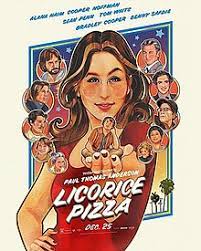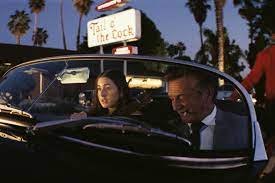
I have seen all of Paul Thomas Anderson’s films and it’s fair to say that he has a certain kind of voice through his filmmaking, and that voice is a dark one. There are exceptions, of course, but his films tend to be serious, deliberate, and artistic. Licorice Pizza goes against type more than any of his other films. It’s still artistic and, at times, deliberate, but it’s also a witty, charming, and (dare I say) spunky film about falling in love with someone despite the world telling you that you shouldn’t love that person.

The main character, Alana (Alana Haim), is one of my favorite characters from any PTA film. She’s an enigmatic free-spirit who has found herself as the target of the affections of a 15-year old boy, and she herself is 25. Like many of his other lead characters, she’s a lost soul who is trying to find herself in the world. However, what separates Alana from almost any other character in the PTA cannon is that she always manages to find the good in any situation. No matter what happens to her, she somehow ends up on the positive end of it. I would love to give examples, but you really need to see the film in order to know what I mean. The best example of it to watch for is when she’s asked to go out for a drink with City Councilman Joel Wachs.
PTA is a filmmaker for me who is generally hit or miss. I loved Punch Drunk Love, Boogie Nights, There Will Be Blood, and Phantom Thread. I really disliked Magnolia, The Master, and Inherent Vice. However, Licorice Pizza falls somewhere in between. I didn’t love it, but I didn’t hate it either. I found it to be one of his most entertaining films, but I had some real issues with the story. I also have a problem with the premise.
I will start with the premise first. It’s about a relationship that brews between Alana, who is 25, and Gary Valentine (Cooper Hoffman), who is 15. Alana, despite her internal issues, is pretty and cool and smart. Gary is a struggling child actor who is kind of dumpy and nerdy. Personally, it’s hard to believe that Alana would have anything to do with Gary, but she improbably shows up at the restaurant he invites her to and that’s when their relationship starts moving forward. As predatory relationships go, it’s probably not as predatory as the one in Call Me By Your Name, but at the very least, it’s problematic and not very realistic. I might have been able to buy it if she had been 22 or 23 and he had been 17, and probably better looking. Call me shallow, but I just didn’t see this relationship as realistic based on the parameters we were given. Honestly, if I’m being brutally honest, this premise feels more like a young boy’s fantasy playing out on the big screen than a realistic story scenario.

The point could be (and has been made) that this is a platonic relationship between a teenager striving to be an adult and an adult who’s afraid to grow up, at least until the third act. However, there are too many instances where the relationship becomes too flirtatious and there are too many other instances where one or the other of them is clearly jealous of the other being in a potentially romantic relationship for this to be viewed as platonic. These two people clearly have romantic feelings for each other almost from the start.
That leads me to the storyline, which had some great moments but ultimately ended up being less than the sum of its parts. The heading of this blog is that it was almost great. It was one of those frustrating storylines where the director puts his characters in potentially dramatic situations and plants ideas that can lead to serious consequences and then fails to pay them off. It was as though PTA fell into the trap of loving his characters so much that he didn’t want them to really get hurt, which is just about the most un-PTA thing ever. If you’ve seen any PTA films, one thing is for certain. Everyone is going to go through an emotional meat grinder. While there is a lot of emotional angst in Licorice Pizza, no one experiences the emotional pain that the characters do in The Phantom Thread or There Will Be Blood or Magnolia or even Boogie Nights or Inherent Vice.

Plenty of bad things start to happen. Gary gets arrested on suspicion of murder but is quickly released. Alana is coerced into taking part in a dangerous stunt with a drunken Jack Holden (Sean Penn) but falls off the motorcycle as Holden takes off and is uninjured. It looks like they’re going to get caught running afoul of the psychotic John Peters (Bradley Cooper), but Alana miraculously coasts the moving truck they’ve rented, but is out of gas, in reverse down the hill.

There is a moment at the end of that scene where Alana should have an epiphany. She’s hanging around with kids ten years younger than her. In fact, she does have a sort of epiphany, and she starts volunteering for a local city councilman who’s running for mayor of Los Angeles. We actually start to see some real character growth from her. At this point, I was hoping that we would see an ending like from The Way We Were or Casablanca where the two main characters understand that they can’t be together and each one goes on to live their separate lives. To me, an ending like that would have been a lot more satisfying.
Leading me to my final point. The ending is completely unsatisfying. It’s shot and cut together like it’s supposed to be this cathartic and emotionally powerful moment, but I felt nothing. I couldn’t care less. In fact, I saw what was coming, and I was rooting for something else. The opportunity was there for this film to have a strong and emotional ending, but like the rest of the film, that opportunity was missed.
As entertaining as Licorice Pizza was to watch, it is ultimately a movie that is plagued by missed opportunities. If PTA had cashed in on even a couple of those opportunities, this movie would have been a lot more dramatic and I would have cared a lot more about what happened. In the end, that’s what is so frustrating about this movie. All of the ingredients were there for this to be one of PTA’s best films. It was charming, witty, and funny, but ultimately there was no emotion and no depth and we’re left with no reason to care.